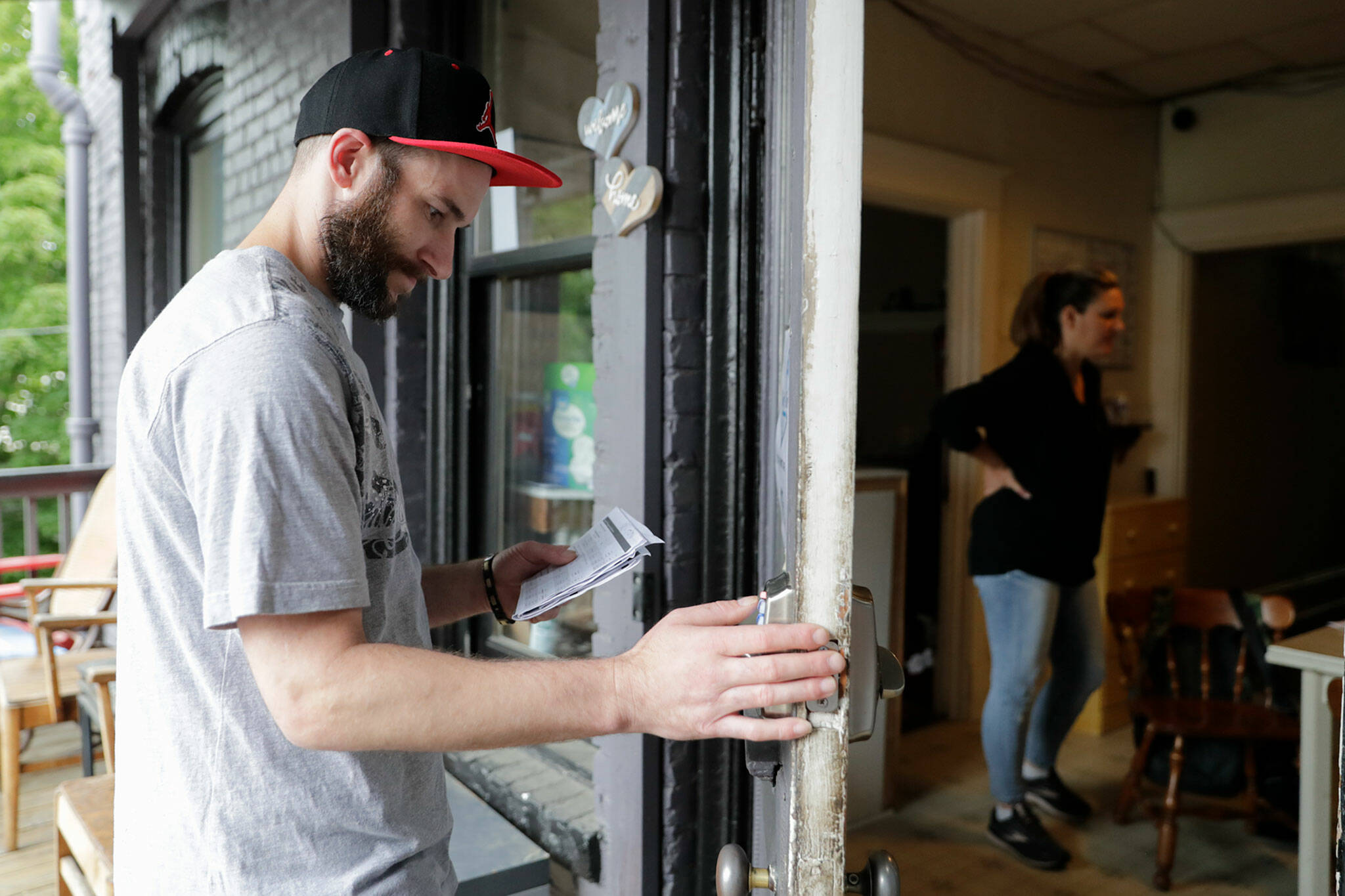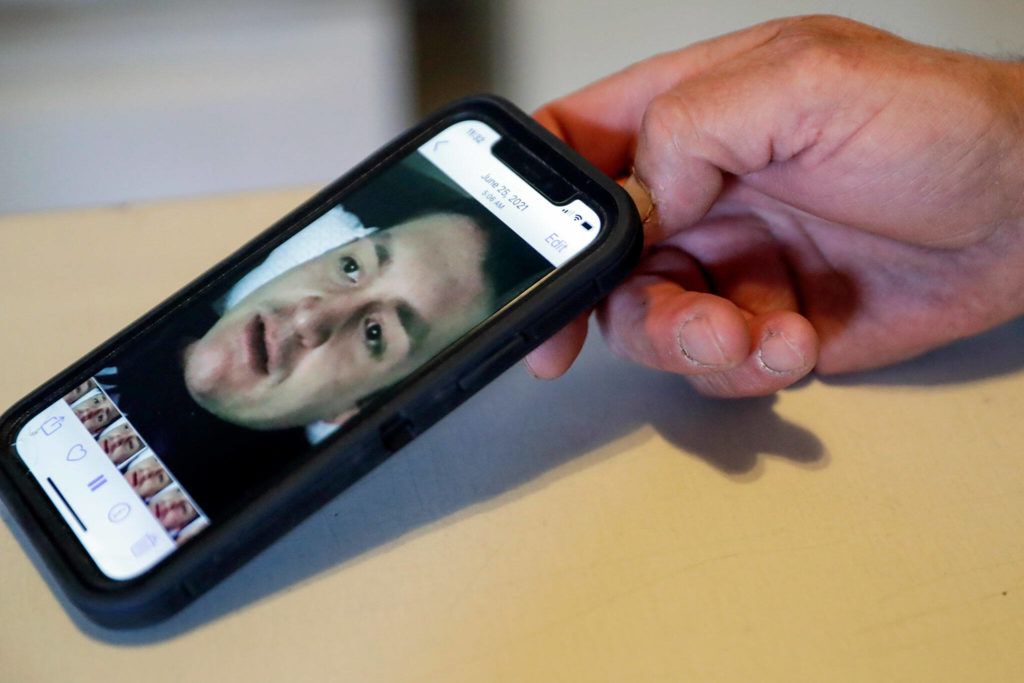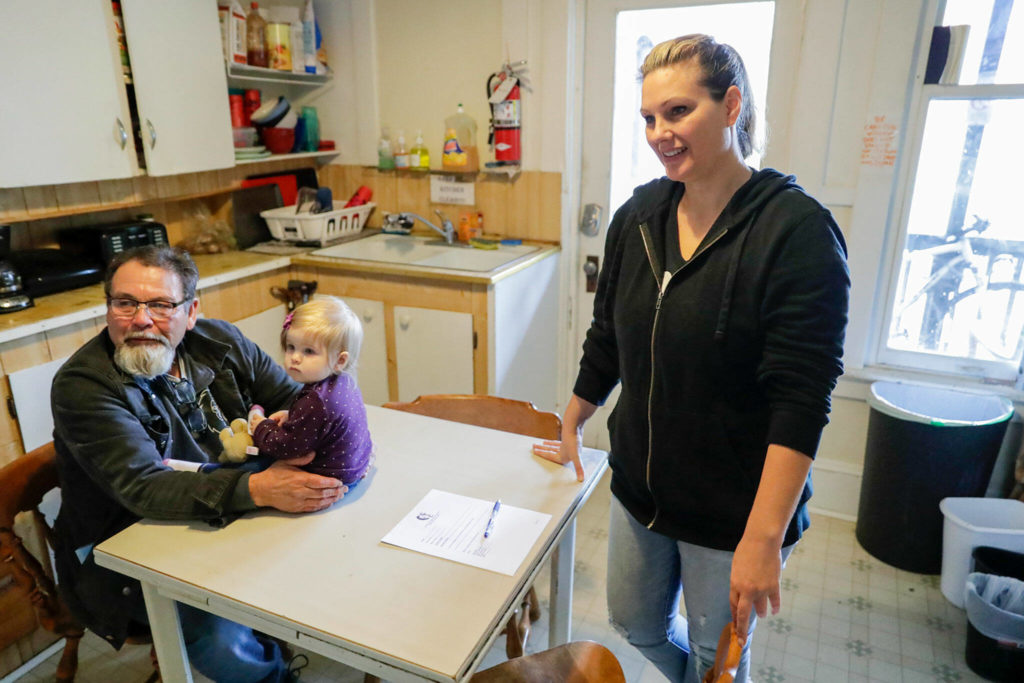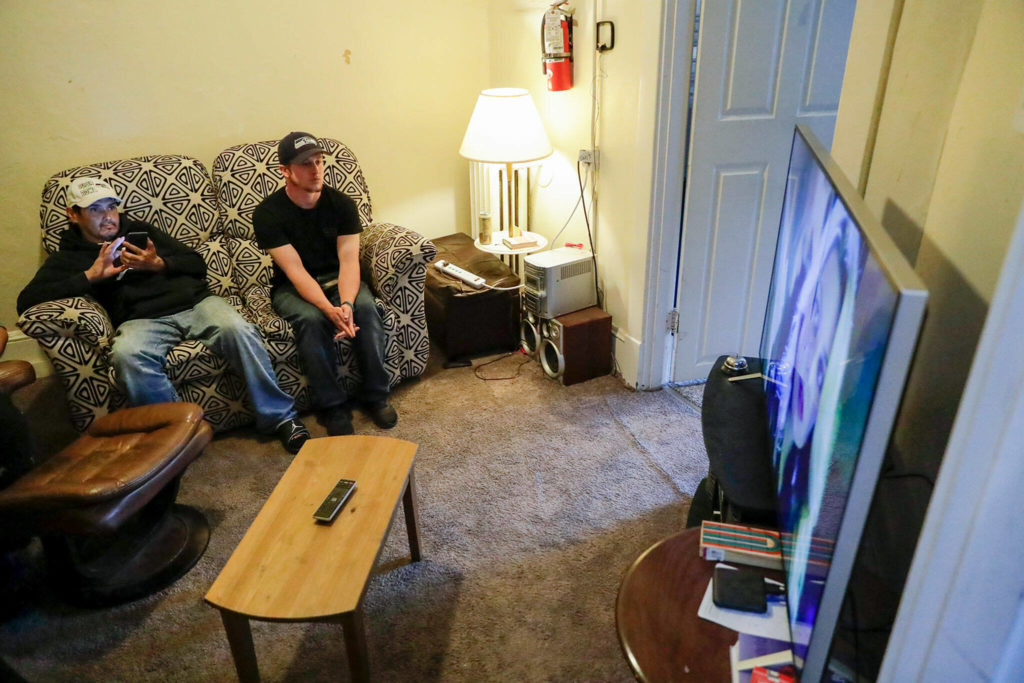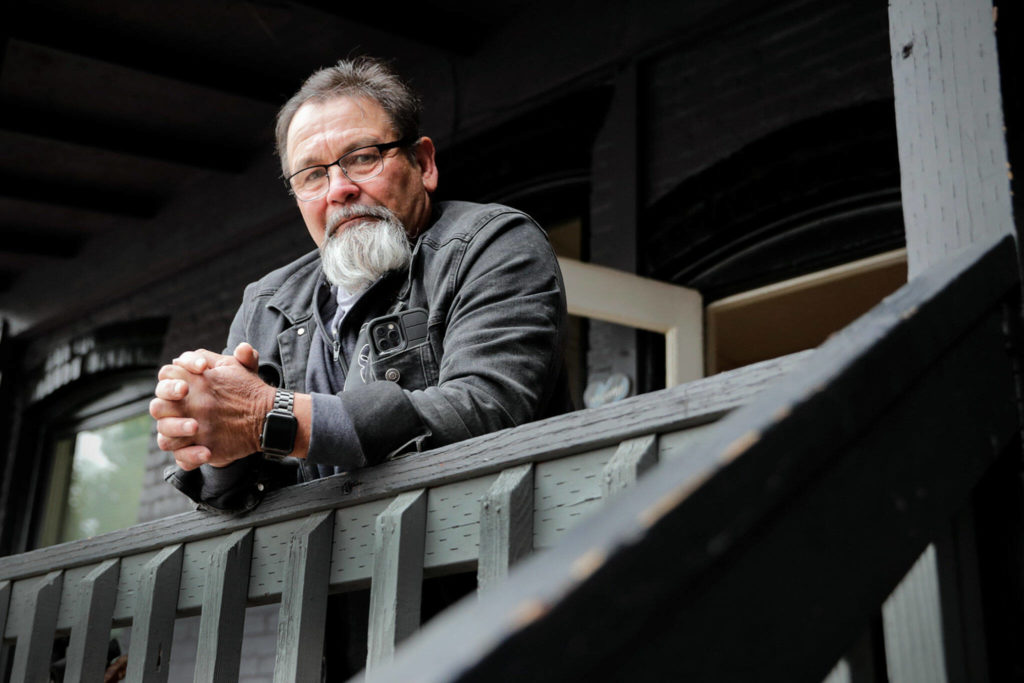EVERETT — Jimmy Hanson warned the stranger not to snort that blue pill all at once.
He’d been peddling them in south Everett for just a few months. This would be his last sale.
Hanson watched the man walk toward the street and snort the whole thing anyway. He collapsed as the fentanyl overwhelmed his system.
Hanson told the story on his back porch in June through a tobacco-packed lip.
“I pulled him out of the street,” he said. “Started giving him CPR.”
Paramedics arrived, but the stranger didn’t make it.
He joined a growing number of people in the county taken by the synthetic opioid. The Snohomish County Medical Examiner’s office keeps track. Since 2020, they’ve added 344 names to the list.
The oldest was 69. The youngest, just a year old. Almost all were accidents. Three were suicide.
Sometimes, fentanyl was found alone. Sometimes it was mixed with cocaine, alcohol, meth, morphine, heroin. Sometimes, the medical examiner lists big words to describe how the oxygen was cut off from the brain: Hypoxic-ischemic encephalopathy. Anoxic brain injury.
From 2018 to 2021, fentanyl deaths more than tripled in the county. Experts say the death toll will continue to mount.
After seeing the man in south Everett die, Hanson stopped selling the cheap blue pills, manufactured through a long line of foreign labs and local kitchens.
“And I started using them,” he said.
These days, Hanson introduces himself as a guy who grew up riding horses in Darrington. A father with more than 100 days of sobriety under his belt.
“I’m a Pisces, too,” he said.
The 35-year-old started using hard drugs as a child. First meth, then heroin. Finally, he turned to the even deadlier compound now dominating the streets.
He’s witnessed fentanyl’s growing toll firsthand.
“This year’s been bad,” Hanson said. “I’ve lost like five friends.”
That includes his “street mom,” who died of a fentanyl overdose earlier this year. Hanson didn’t recall her full name.
“I just called her mom,” he said. The woman often gave him a place to stay, a meal or cash.
Then fentanyl took someone Hanson considered a sister. They grew close when he stood up to her abusive father.
Hanson, too, almost joined this morbid list.
On his 35th birthday this year, that stranger’s death weighed heavy on him. So did the loss of so much of his family, both biological and chosen.
Hanson tried to take his own life, smoking over 100 fentanyl pills.
“It took three Narcans and two epipens to bring me back,” he said.
Some members of Congress want to designate fentanyl a weapon of mass destruction. When Hanson learned this, he shrugged: “I mean, it makes sense.”
Hanson stepped inside the kitchen and made kissy faces at a chubby-cheeked baby. The black building on Hewitt Avenue used to be a brothel. Legend has it Teddy Roosevelt was a guest. It’s a sober shelter now, with about a dozen roommates filtering in and out, sleeping in twin bunk beds. Men cram into a living room to watch mystery dramas and roll cigarettes.
Christina Anderson rocked the babbling baby inside. She helped start this place up last December, with local nonprofit Courage to Change. The organization kept getting their clients through detox, only to see them turned back onto the streets to wait for a spot in long-term treatment. That in-between time was a chasm.
“We kept losing people,” Anderson said.
Hopefully, this new shelter will hold people tight as they wait for the next step in recovery.
But it’s tough. Anderson gestured to an open window, where the sound of downtown Everett wafted inside.
“We’re in the thick of it,” she said.
A $5 pill — a $5 relapse — can be found just outside.
Hanson feels like this place is a bubble. Fentanyl could pop it at any moment.
A roommate was kicked out last month for smoking fentanyl inside. The smell of a flame on tinfoil almost broke Hanson.
“I felt I could slip up right then,” he said. “One person could trigger the whole house to use.”
‘Dropping like flies’
Mike Kersey starts his day at an espresso hut. A caramel mocha for him and a biscuit for his border collie, Bandit.
The duo just dropped a man off at a rehab in Smokey Point. A nurse with a lanyard and a ponytail called them “miracle workers.”
For years, Kersey’s been driving this white van around Western Washington, picking up strangers and friends. He chauffeurs them to each part of recovery — detox, out-patient treatment, the shelter on Hewitt.
His cellphone number has passed through police stations, rehabs and homeless encampments.
This particular morning, a man in Anacortes got Kersey on the line. Semi trucks rumbled by as Kersey pulled the van to the side of the highway.
The stranger, 40 miles away, was in trouble with the police, and needed a ride to detox. He handed his phone to an officer, so Kersey could tell him the plan.
Kersey would find an open detox bed and pick the guy up in the morning.
“We’re all good people,” he told the cop over the phone. “We’re just sick, trying to get better.”
Yes, Kersey told him, the officer could go ahead and pass his number to the police chief.
Later, Kersey fielded a call from a Lynnwood detox.
“You got any male beds?” he asked. “Oh, thank God.”
Like you might expect of a “miracle worker” and his canine sidekick, Kersey has a catchphrase.
Ask him how he’s doing and he’ll smile and quip: “Living the dream.”
Exhausted voicemails and late night musings betray him.
In May, Kersey left a Daily Herald reporter a message.
“I lost another client. Just 20 years old. But um, I’m just thinking about that. And all these deaths are just driving me insane. Anyway, if you get time, give me a call.”
Later that day, he tried to tally all the clients he has lost to fentanyl.
“Two more last night, and this kid was found day before yesterday,” he said. “They’re just dropping like flies.”
Like the county medical examiner, Kersey keeps a list of these victims. It’s less formal: phone notes titled “weekly report.” They’re filled with selfies he takes with passengers before and after detox.
With each photo, he gives an update: Doing well. Back in detox. Relapsed. Dead.
There’s a pregnant mother. A commercial fisherman. A 21-year-old in a trendy sweatshirt. A local jeweler. A grandfather. A young woman who escaped sex trafficking. A fentanyl dealer.
“I know four people in the last week died from fentanyl overdose,” Kersey said. “They get desensitized to the death around them, you know? You could walk right over a body, sit 10 feet away and smoke your fentanyl before you call the cops. They’re so wound up in it.”
He repeated what he told that Anacortes officer: “We’re all good people when we get clean and sober. But some just don’t make it.”
‘The fear never really went away’
John Shreeves brought more than one friend back to life.
In Everett-area encampments, he was known for carrying plenty of Narcan, the overdose-reversing medication. People called him Boomer. He was a messenger.
“This is what my brother always said to them,” his sister Mikaila Wise said. “Never use alone. Have a buddy. Know how to use Narcan. And most importantly, know where you’re getting your drugs.”
Boomer knew all the dealers, Wise said. And he’d spread the word if they were lacing heroin or meth with fentanyl.
Overdosing was Boomer’s worst fear. He’d call his sister back in Iowa to talk about girlfriends, his heroin and meth use, and how he was terrified his addiction would kill him.
“He wouldn’t get to say goodbye to the people he loved,” Wise said. “The fear never really went away.”
He had overdosed once already, in a Washington state park last year. Narcan revived him, and he returned to a Lynnwood trailer park to see his best friend, Dixie Murphy.
“I gave him a nice little lecture and a big hug,” Murphy said, “and told him to never scare me like that.”
A few weeks later, on Nov. 9, Boomer overdosed again, just a few blocks away from Murphy’s place. The medical examiner determined he died from “acute intoxication with fentanyl, acetyl fentanyl, morphine and methamphetamine.” He was 39.
Boomer grew up in foster care in the Midwest, where strangers often assumed he and Wise were twins.
He was “full of piss and vinegar” back then, Wise said. He climbed trees near the Missouri River. The duo liked to mash up wild berries by the schoolyard, spreading the colorful goop all over their sunkissed skin. If a young Boomer saw a neglected dog tied to a tree, he’d cut it loose and bring it home.
As an adult, living in tents or motels in the Everett area, he played harmonica and helped Murphy fix up her trailer. With a criminal record and no permanent address, it was tough to find a job. He got a box truck and was trying to make money moving furniture.
When asked where Boomer’s nickname came from, Dixie chuckled. The truth is, she’s not sure. Boomer offered a different story each time she asked.
Maybe it’s because as a child, he’d chuck M-80s — cherry bombs — into mailboxes.
This Fourth of July won’t be the same without him, Murphy said. She used to hear booms from her trailer, and text him: “I heard that.”
He’d reply: “Who, me?”
As a child, Boomer shuffled through abusive foster homes with his siblings. They were eventually separated. That’s when his addiction took hold.
“Often times we’d be locked in rooms, thrown a jar of mustard and a loaf of bread and that’d be our food for a week,” Wise recalled. “He said it was just all his demons of his past. He couldn’t fight those.”
Wise feels like dealers lacing their drugs with fentanyl have it out for people like Boomer.
“They’re targeting the homeless people,” she said, “because most of the time once they’re gone, nobody really cares to investigate how they die. Nobody really cares.”
Wise and Murphy are trying to organize some sort of service for Boomer. It’s hard, since many of his friends live on the street. Wise plans to spread some of his ashes in the river he splashed in as a kid. The rest will be buried with her, when her time comes.
“This incident shouldn’t have happened,” Wise said.
Her brother was ready to get sober. But local rehabs kept giving him “30 day shocks” — quick programs that dumped him right back into homelessness. He had plans to return to the Midwest, take care of his warrants and get sober with his sister’s help.
“He was ready,” Wise said. “He just never got that chance.”
‘I love you 577 times’
Benjamin was contemplating murder.
It was fall 2021, and the police just found his dad dead at home in Marysville.
After scrolling through his father’s texts, Benjamin figured out who sold him those blue pills. He cold-called the dealer from his dad’s phone.
She picked up and asked if Benjamin’s father was dead.
“I said, ‘How did you know?’ And she (expletive) hung up. She hung up, so she (expletive) knew what she did,” Benjamin told The Herald.
He asked his friend for a favor: “I want this (expletive) (expletive) dead.”
Benjamin abandoned his plan. He can’t raise his kids from prison.
The Herald isn’t using Benjamin’s real name. The Snohomish County man said he wants to talk openly about fentanyl and overdose. At the same time, he knows that stigma could hurt his family.
Instead of going after that fentanyl dealer, Benjamin “screamed at the sky.”
His dad’s body was found on a Saturday. He screamed until Sunday.
Benjamin had seen headlines about fentanyl. He warned his dad about it. Fentanyl is often pressed into fake “M30” oxycodone pills. Some people know what they’re getting when they buy “blues” on the street. But Benjamin’s dad thought he was getting a painkiller. He started misusing pain meds after an accident earlier that year.
“He was really just a big dumb kid. He just didn’t know better,” he said. “We literally had the conversation about how deadly fentanyl is. … It was literally his first time.”
Decades ago, as a union carpenter, Benjamin’s dad worked on the U.S. 2 trestle. He would take young Benjamin to the docks to feed seagulls white bread. They’d go to the library to check out art books. Benjamin could draw horses over and over. They went to the retirement home to cheer up lonely seniors.
“He was really rough around the edges,” his son said. “He still loved me, but he could’ve done a lot better.”
The Marysville dad would beat his son with a belt, Benjamin said. He struggled with alcoholism, and would spike his cinnamon tea on the way to church. He thought the buzz made him more sociable.
But with age, he softened into a goofy grandfather. He showed up to little league games. One young granddaughter took on his loud, boisterous laugh.
“He did a lot of redemption later in life,” Benjamin said.
He told his son how proud he was. He told his grandkids he loved them “999 trillion times,” or “777 thousand-million times.”
Benjamin’s kindergartner is carrying on the tradition. The kid doesn’t know many big numbers yet.
“He just started learning how to do math,” Benjamin said. “He’s like ‘Dad, I love you 577 times.’”
‘A real one’
Nick McGlashan started as a “bait guy” in Alaska at just 12 years old. His dad, Bruce Lanford, became a captain in Dutch Harbor at just 23.
“He had some big shoes to fill, and he knew that,” Lanford said aboard his SBS Provider. The massive crabbing ship was docked in Seattle, preparing for another season up north.
Lanford pulled his son out of school in Montana to keep working in the fishery. He was good at it. He’d do homework packets onboard.
McGlashan’s fishing experience was different from his dad’s. The vices onboard the ships changed over time. In Lanford’s day, he watched crew members use alcohol and cocaine. Heroin and fentanyl seem to have taken over, he said.
Plus, McGlashan was living out his crabbing career in front of TV cameras. He starred on the hit show “Deadliest Catch.”
Lanford didn’t approve.
“I knew where it would lead,” he said. “Arrogance. And arrogance is the breeding ground for all bad things that happen in this world.”
At 33, McGlashan’s death was publicized far and wide. He overdosed on meth, cocaine and fentanyl in December 2020 on a trip to Nashville.
“You just assume when you see the word fentanyl, that was the main ingredient that killed him,” Lanford said.
The sober shelter on Hewitt bears McGlashan’s name. Mike Kersey named it “Nick’s Place.” Kersey drove McGlashan to rehabs around here more than once. The two men would serve spaghetti to homeless folks outside an Everett church.
After one relapse in 2019, Mike stayed in McGlashan’s Arlington hotel room for days.
“He was scared to stay alone because he knew he would use,” Kersey recalled. “So I stayed with him until I couldn’t stay any longer.”
Kersey placed some blame on Hollywood. He remembered when McGlashan relapsed at an awards ceremony after-party.
“He’d been sober for a while before that,” Kersey said. “So I know he felt really guilty about it.”
McGlashan became a board member with Kersey’s nonprofit, Courage to Change. He sent a video diary to Kersey when he got back on the ship, one year sober.
“It’s a big deal,” he said, laying in his cot. “Life’s going to get better, and it’s going to get better fast.”
But McGlashan was in a “vicious cycle,” Kersey said. He’d return to drugs during crabbing season.
Lanford watched his son’s friend group shrink and warp. Gone were the good influences, Lanford said, replaced by friends who “don’t give a flying (expletive) whether you die or not.”
At his home in Florida, Lanford sometimes researches overdose statistics. He once reached out to his congressman about it.
“We have a problem. A bad problem. And for whatever reason it’s just swept under the rug,” Lanford told him. “He said, ‘Bruce, I’m with you. But you’re falling on deaf ears in Washington.’”
If Lanford won the lottery, he’d start his own rehab center.
“A real one,” he said.
A program that keeps people for six months. Helps them get a job and housing. It should be federally subsidized, Lanford said. Not run like a business. It shouldn’t pay counselors “pathetic” wages.
It wouldn’t be like the 30-day programs his son went through, Lanford said. They didn’t work. And after several tries, and several relapses, Lanford said he accepted his son’s fate.
“I would outlive my son,” he said. “I knew that phone call would come any day.”
Claudia Yaw: 425-339-3449; claudia.yaw@heraldnet.com; Twitter: @yawclaudia.
Resources
Find treatment options near you at SAMHSA’s findtreatment.gov
Washington Recovery Help Line: 1-866-789-1511
Find resources and recovery meetings at Everett Recovery Cafe: 1212 California St., 425-258-5630
The Carnegie Resource Center is Snohomish County’s resource hub at 3001 Oakes Ave., Everett, 425-434-4680.
How to administer Narcan: vimeo.com/357020563 and bit.ly/3OWWjrL
Washington state pharmacies carry Narcan (also known by its generic name naloxone) and can distribute without a prescription. Insurance may cover some of the cost.
County resources: snohomishoverdoseprevention.com
Other fentanyl-related stories:
• ‘Whole new demon’: Fentanyl deaths soar, and recovery is harder (April 10, 2022)
• As local kids get hooked on fentanyl, there’s ‘no place for them to go’ (May 8, 2022)
• Inside the fight over Suboxone, a life-saving drug with stigma (June 5, 2022)
Talk to us
> Give us your news tips.
> Send us a letter to the editor.
> More Herald contact information.
